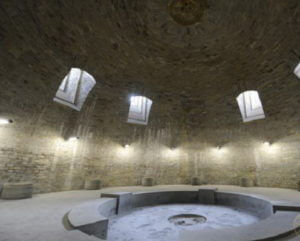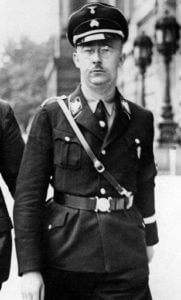
In Prague was found a depository with Himmler Magic Library
 3
3
 26. 10. 2017
26. 10. 2017

Heinrich Himmler, the Reich's SS leader and Gestapo chief during the Holocaust, was one of the leaders of the Third Reich. The graduate agronomist believed that German nationality was chosen and considered its representatives to be real Arias.
He was literally obsessed with the idea of the supernatural. He hypothesized that the study of Old Germanic mythology would help to substantiate racist theories, and that the magic books themselves protected the key to unlimited power over the world. Hitler never fully shared the enthusiasm of his favorite, but left him free.
Himmler was so fascinated by the idea of devil worship that in 1935 he initiated the establishment of a special unit SS H-Sonderkommando. The first letter of the name is not accidental, as it begins with the German word Hexe, which means witch in translation. The unit, which existed until 1944, collected materials related to the occult and magic.
A huge part of the collection of printed publications, which the staff of the H-Sonderkommando collected from two hundred and sixty libraries and archives, was called Magical. Much attention was paid to the history of the persecution of witches in medieval Germany. Years of research have led Nazi scientists to believe that the Roman Catholic Church sought to destroy the Aryan race in this way. What's more, Himmler learned that among the women burned at the border was his great-grandmother.
The Reichsführer SS wanted to exhibit part of the collection at the Black Camelot Castle (historical name of Wewelsburg Castle), which lies in northwestern Germany. Here he held meetings of the secret consistory, based on the legends of King Arthur and the Knights of the Round Table.
 Twelve SS officers played the role of knights, and of course the king was the owner of the castle himself. He tried to confuse Christian symbolism with paganism, which was much older and more powerful. This place, where the Nazis engaged in necromancy and conducted spiritualist sessions, is still one of the main tourist attractions.
Twelve SS officers played the role of knights, and of course the king was the owner of the castle himself. He tried to confuse Christian symbolism with paganism, which was much older and more powerful. This place, where the Nazis engaged in necromancy and conducted spiritualist sessions, is still one of the main tourist attractions.
Some of the books in Himmler's collection were previously stored in the Masonic Library in Oslo. According to Bjørn Helge Horrisland, a Norwegian scientist and historian who identified these specimens, six thousand books of the Freemasonry were exported from the country during the Nazi occupation.
Since the 1950s, the depository has not been used by anyone, so the collection has remained secret for more than sixty-five years.
[last update]
The exact place where the bookstore was located in Prague is still kept secret. The National Library of the Czech Republic has issued a statement that there is no such thing. Such a report can be interpreted in several ways ...






